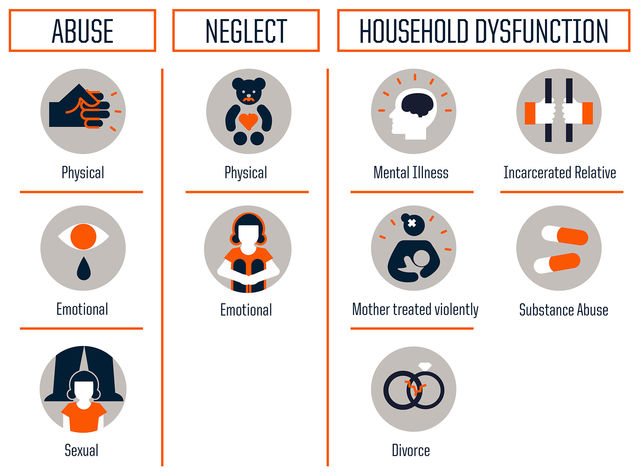Adverse Childhood Experiences
Seven Early Experiences with Potential Benefits in Adulthood
Seven positive childhood experiences are linked to better adult mental health.
Updated May 17, 2024 Reviewed by Devon Frye
Adults who self-report more positive childhood experiences (PCEs) tend to have a lower likelihood of clinical depression or poor adult mental health—and a higher probability of healthy adulthood interpersonal relationships—according to a new survey-based study from Johns Hopkins University. These findings (Bethell et al., 2019) were published online today in the journal JAMA Pediatrics.

A total of 6,188 women and men over the age of 18 participated in this survey. Although the study has some significant limitations (e.g., cross-sectional, observational, correlational) and cannot confirm causal effects, the findings suggest that the seven interpersonal positive childhood experiences (that were the focus of this research) could have lifelong, beneficial ripple effects on mental and relationship health.
Christina Bethell and co-authors hope their recent findings will be a call to action for parents and public health advocates to take a two-pronged approach to:
- Boost positive childhood experiences
- Reduce adverse childhood experiences.
"This study offers the hopeful possibility that children and adults can thrive despite an accumulation of negative childhood experiences," Bethell said in a statement. "People assume eliminating adversity automatically results in good health outcomes, but many people reporting lower adversity in childhood still had poorer mental and relational health outcomes if they did not also report having had positive childhood experiences."
"PCEs" and "ACEs" Are Two Sides of the Same "Childhood Experiences" Coin
If you bumped into someone on the street taking this psychological survey and they randomly asked: "Before the age of 18, did you experience more positive childhood experiences (PCEs) or more adverse childhood experiences (ACEs)?" what would be your knee-jerk response?

Over the years, I've written extensively about the 10-point ACE scoring system (1998) of childhood adversity represented by the "Abuse, Neglect, Household Dysfunction" CDC chart above.
I know my ACE score; therefore, my very first response to the survey taker would be: "I've taken the ACE test but, until now, I'd never heard of PCEs. Exactly what type of early life experiences do you classify as so-called 'positive childhood experiences?'"
Below are the seven items on the positive childhood experience (PCE) psychometric analysis. For each item, respondents are asked to respond "yes" or "no" to a prompt, "Before the age of 18, I was..."
- Able to talk with my family about my feelings.
- Felt that my family stood by me during difficult times.
- Enjoyed participating in community traditions.
- Felt a sense of belonging in high school.
- Felt supported by friends.
- Had at least two non-parent adults who took a genuine interest in me.
- Felt safe and protected by an adult in my home.
Now that you know the seven PCEs, how many times did you answer "yes" on this seven-item survey? The higher your score, the more positive childhood experiences you had based on this psychometric analysis.
According to the researchers, "This study designed, tested, and used a new positive childhood experiences measure that showed a dose-response relationship between how many positive experiences adults reported and their mental and relational health. This new "cumulative positive" design captures aggregate experiences in the same way adverse childhood experiences measure 'cumulative risk.'"
As mentioned, the latest Johns Hopkins survey also gave respondents the standard adverse childhood experiences (ACEs) quiz. (If interested, you can get your ACE score by clicking on this free NPR link and answering "yes" or "no" to 10 questions.)
Additionally, the thousands of men and women who participated in the recent study (2019) provided information about their mental health history (e.g., whether they had received a diagnosis of depression) as well as how many "poor mental health days" they'd experienced in the past month.
Lastly, each respondent was asked how often they felt they'd gotten enough social and emotional support. This metric is classified as "Adult-Reported Social and Emotional Support (ARSES)."
In the paper's discussion section, Christina Bethell and co-authors "hypothesize that PCEs may have a greater influence in promoting positive health, such as getting needed social and emotional support or flourishing as an adult. In turn, these positive health attributes may reduce the burden of illness even if the illness is not eliminated."
"Overall, study results demonstrate that PCEs show a dose-response association with adult mental and relational health, analogous to the cumulative effects of multiple ACEs," the authors concluded. "Findings suggest that PCEs may have lifelong consequences for mental and relational health despite co-occurring adversities such as ACEs."
If you are a parent, guardian, or caregiver of someone under 18: In closing, I've reframed the seven positive childhood experiences (PCEs) listed above in the third person, present tense. The next time you need a reminder on how to plant the seeds of future flourishing for your kid(s), say to yourself:
"Children are more likely to have better mental health, a lower risk of depression, and healthier relationships in adulthood if they are able to:
(1) Talk with family members about their feelings, (2) Feel that their families stood by them during difficult times, (3) Enjoy participating in community traditions, (4) Feel a sense of belonging in high school, (5) Feel supported by friends, (6) Have at least two non-parent adults who take genuine interest in them, and (7) Feel safe and protected by an adult in their home."
The good news for every parent is that these PCE items are practical and, for the most part, easy to facilitate in your child's day-to-day life.
Here's a follow-up post: 8 Research-Based Reasons I Rose-Tint Some Childhood Memories
Facebook image: Ivanko80/Shutterstock
LinkedIn image: LightField Studios/Shutterstock
References
Christina Bethell, Jennifer Jones, Narangerel Gombojav, Jeff Linkenbach, Robert Sege. "Positive Childhood Experiences and Adult Mental and Relational Health in a Statewide Sample: Associations Across Adverse Childhood Experiences Levels." JAMA Pediatrics (First published online: September 9, 2019) DOI: 10.1001/jamapediatrics.2019.3007




